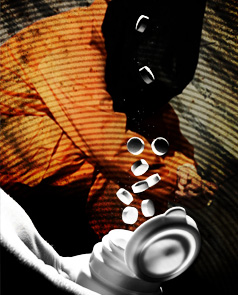
(Image: Jared Rodriguez / t
r u t h o u t ;
Adapted: Okko Pyykkà �, electron)
From Truthout Note: Investigative reporter Jeffrey Kaye participated in the investigation and writing of this report.
The Defense Department forced all "war on terror"
detainees at the Guantanamo Bay prison to take a high dosage of a
controversial antimalarial drug, mefloquine, an act that an Army public
health physician called "pharmacologic waterboarding."
The US military administered the drug despite Pentagon knowledge that
mefloquine caused severe neuropsychiatric side effects, including
suicidal thoughts, hallucinations and anxiety. The drug was used on the
prisoners whether they had malaria or not.
The revelation, which has not been previously reported, was buried in documents publicly released by the Defense Department (DoD) two years ago as part of the government's investigation into the June 2006 deaths of three Guantanamo detainees.
Army Staff Sgt. Joe Hickman, who was stationed at Guantanamo at the time of the suicides in 2006, and has presented evidence that demonstrates the three detainees could not have died by hanging themselves, noticed in the detainees' medical files that they were given mefloquine. Hickman has been investigating the circumstances behind the detainees' deaths for nearly four years.
Interviews with mefloquine and malaria experts and a review of peer-reviewed journals and government documents show there were no preexisting cases where mefloquine was ever prescribed for mass presumptive treatment of malaria.
All detainees arriving at Guantanamo in January 2002 were first given a treatment dosage of 1,250 mg of mefloquine, before laboratory tests were conducted to determine if they actually had the disease, according to a section of the DoD documents entitled "Standard Inprocessing Orders For Detainees." The 1,250 mg dosage is what would be given if the detainees actually had malaria. That dosage is five times higher than the prophylactic dose given to individuals to prevent the disease.
Maj. Remington Nevin, an Army public health physician, who formerly worked at the Armed Forces Health Surveillance Center and has written extensively about mefloquine, said in an interview the use of mefloquine "in this manner ... is, at best, an egregious malpractice."
The government has exposed detainees "to unacceptably high risks of potentially severe neuropsychiatric side effects, including seizures, intense vertigo, hallucinations, paranoid delusions, aggression, panic, anxiety, severe insomnia, and thoughts of suicide," said Nevin, who was not speaking in an official capacity, but offering opinions as a board-certified, preventive medicine physician. "These side effects could be as severe as those intended through the application of 'enhanced interrogation techniques.'"
Mefloquine is also known by its brand name, Lariam. It was researched by the US Army in the 1970s and licensed by the Food and Drug Administration in 1989. Since its introduction, it has been directly linked to serious adverse effects, including depression, anxiety, panic attacks, confusion, hallucinations, bizarre dreams, nausea, vomiting, sores and homicidal and suicidal thoughts. It belongs to a class of drugs known as quinolines, which were part of a 1956 human experiment study to investigate "toxic cerebral states," as part of the CIA's MKULTRA mind-control program.
The Army tapped the Walter Reed Army Institute of Research (WRAIR) to develop mefloquine and it was later licensed to the Swiss pharmaceutical company F. Hoffman-La Roche. The first human trials of mefloquine were conducted in the mid-1970s on prisoners, who were deliberately inoculated with malaria at Stateville Correctional prison near Joliet, Illinois, the site of controversial antimalarial experimentation in the early 1940s.
The drug was administered to Guantanamo detainees without regard for their medical or psychological history, despite its considerable risk of exacerbating pre-existing conditions. Mefloquine is also known to have serious side effects among individuals under treatment for depression or other serious mental health disorders, which numerous detainees were said to have been treated for, according to their attorneys and published reports.
In 2002, when the prison was established and mefloquine first administered, there were dozens of suicide attempts at Guantanamo. That same year, the DoD stopped reporting attempted suicides.
By February 2002, there were at least 459 detainees imprisoned at Guantanamo. In March of that year, according to the book "Saving Grace at Guantanamo Bay: A Memoir of a Citizen Warrior" by Montgomery Granger, "the situation" at the prison began "deteriorating rapidly."
"There is more and more psychosis becoming evident in detainees ...," wrote Granger, an Army Reserve major and medic who was stationed at Guantanamo in 2002. "We already have probably a dozen or so detainees who are psychiatric cases. The number is growing."
(Note: You can view every article as one long page if you sign up as an Advocate Member, or higher).




